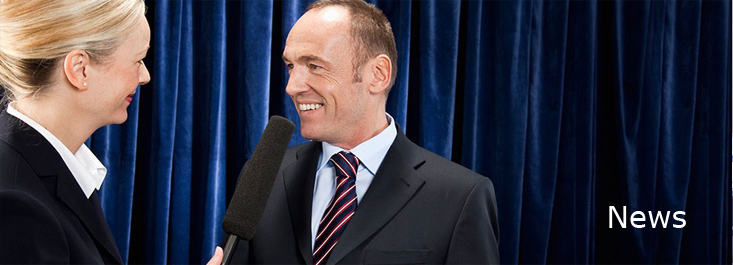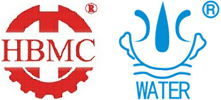When using the tungsten inert gas (TIG) process for arc or plasma welding, tungsten electrodes are used. In both processes, the electrode, the arc and the molten pool are protected from atmospheric contamination by an inert gas. Tungsten electrodes are used because they can withstand very high temperatures with minimal melting or erosion. The electrodes are made from powder metallurgy and are moulded to size after sintering.
When choosing, you must ensure that you use the correct tungsten for the correct power source type, material thickness and type of material to be welded. We know that there are many different types of tungsten electrodes available, so learning how to select the correct tungsten for each application can greatly improve welding performance and save you time and money.
We have listed some of the most commonly produced tungsten electrodes for TIG DC, TIG-AC and plasma welding.
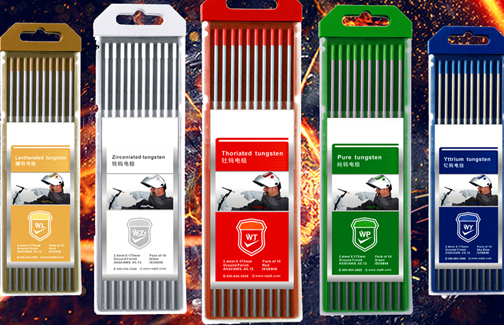
Tungsten Electrode
1. Pure tungsten
AWS Classification: EWP/WP
Major oxides: None
Colour: Green
Non-radioactive. Pure tungsten contains 99.50% tungsten. It is ideal for use in low to medium-amperage applications using only transformer-based constant current (CC) power supplies for alternating current (a/c) in aluminium and magnesium alloys. Pure tungsten balls are easy but do spit out at higher amperages. Most agree that this tungsten is used for non-critical welding applications.
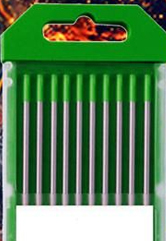
Pure Tungsten Electrode
2. 0.8% Zirconiated
AWS Classification: EWZr-8/WZ8
Primary Oxide: 0.7- 0.9% Zirconium Oxide
Colour: White
No, it is not radioactive. This type of tungsten should never be used for DC welding. For alternating current (a/c) for aluminium and magnesium alloys using inverters or transformer-based constant current power sources. The ball is very good, handles higher currents than pure tungsten, has less spatter and has better arc starting and arc stability than pure tungsten.
3. 1.5% Lanthanated
AWS Classification: EWLa-1.5/WL15
Primary Oxide: 1.3 - 1.7% Lanthanum Oxide
Colour: Gold
This is non-radioactive. 1.5% lanthanated tungsten is very suitable for direct current (d/c) use and can be used in place of 2% thorium tungsten in inverter or transformer based constant current supplies. Best suited for non-corrosive steel, titanium, nickel and copper alloys. Optimum DC arc start and stability, low erosion rates, wide current range, no splash.
Buy lanthanated tungsten electrodes - click here.
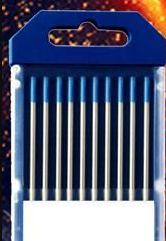
Lanthanated Tungsten Electrode
4. 2% Thoriated
AWS Classification: EWTh-2/WT20
Primary Oxide: 1.7-2.2% Thorium Oxide
Colour: Red
This product is radioactive, so always check the manufacturer's SDS safety document before use. Best suited for direct current (d/c) applications using a transformer based constant current supply. Best suited for use with non-corrosive steels, titanium alloys, nickel alloys, copper alloys. Good DC arc start and stability, medium erosion rate, medium amperage range, medium spatter tendency.
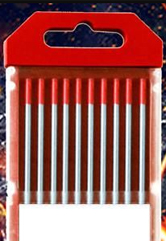
Thoriated Tungsten Electrode
5. 2% Lanthanted
AWS classification: EWLa-2/WL20
Primary Oxide: 1.8 - 2.2% Lanthanum Oxide
Colour: Blue
The 2% Lanthanted tungsten is non-radioactive. The best universal electrode for alternating current (a/c) or direct current (d/c) using a constant current supply based on an inverter or transformer. If you are concerned about the radioactivity of 2% thoriated tungsten, go ahead and try 2% lanthanated tungsten. Suitable for low alloy steels, corrosion resistant steels, aluminium alloys, magnesium alloys, titanium alloys and nickel and copper alloys. Good arc starting and stability, medium to high current range, and low corrosion rates.
6. 2% Ceriated
AWS classification: EWCe-2/WC20
Primary Oxide: 1.8-2.2% Cerium Oxide
Colour: Grey (previously orange)
Non-radioactive. 2% cerium tungsten is best suited for alternating current (a/c) or direct current (d/c) applications using constant current supplies based on inverters or transformers. Suitable for low alloy steels, corrosion resistant steels, aluminium alloys, magnesium alloys, titanium alloys, nickel alloys, copper alloys. Good ignition and re-ignition properties, long service life and excellent arc stability. Low erosion rate, best performance in the low current range, no spatter, good DC arc initiation and stability.
If you neen more information on types of tungsten electrodes, please don’t hesitate to contact us at info@sino-welding.com, we will try our best to support you.


